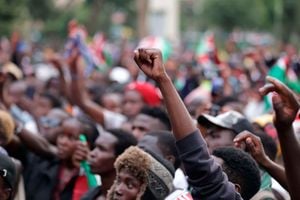
Justice Lawrence Mugambi in court on September 13, 2024. Inset: The Deputy Inspector-General of Police Gilbert Masengeli.
For judiciary watchers and policing buffs, last week offered a captivating forensic theatre, instigated by the alleged abduction of three activists, and a subsequent constitutional petition of habeas corpus lodged before the High Court, requiring the inspector-general of the National Police Service to produce the persons of the missing trio.
The police denied having any of the activists in their custody, and thus, could not comply with the order.
Mr Justice Lawrence Mugambi emphatically disagreed, and made his disapproval known in draconian terms, and found the police bear the responsibility to produce the missing activists, and accordingly ordered the inspector general.
When the police did not, or could not produce the missing activists, the court cited the inspector-general for contempt of court, and subsequently, found him guilty, sentencing him to a spell in prison for his troubles. It was alleged that the acting inspector-general was an obdurate delinquent who, insofar as the implementation of court orders falls within the exclusive remit of the police, could count on his command authority to stay out of reach.
As the matter was on the verge of dissipating into another stalemate of depleted interest, the judiciary, led by the Chief Justice, rose up in arms to protest the withdrawal of Mr Justice Mugambi's bodyguard, which, they vehemently averred, was not only an egregious retaliation and a violation of the judge's decisional independence but also a flagrant infringement of the rule of law by the acting inspector-general.
Not only was it stoutly urged that a judge's security detail is an inviolable component of a judge's terms of service, whose removal fundamentally undermines judicial independence, it was also strongly implied that a bodyguard is a critical to the proper definition of a judge, and as such, withdrawal thereof severely diminishes the essence of judicial authority.
Conviction for contempt of court
To this, the acting inspector-general responded that only the president and his deputy, as well as the retired president, are by law entitled to a bodyguard, and everyone else is eligible on the basis of case-by-case evaluation of security needs, and that officers in Mr Justice Mugambi's detail were merely on leave to attend advanced training.
At the same time, the acting inspector-general proceeded to lodge an appeal against his conviction for contempt of court and, on the strength of this intended appeal, sought a stay of execution of his incarceration, which was denied.
As this happened, Parliament approved the appointment of the new inspector-general, which would only take effect upon being sworn in by the Chief Justice, the head of the Judiciary, President of the Supreme Court and chair of the Judicial Service Commission.
Subsequently, the missing activists materialised in concerning circumstances, as the acting inspector-general volunteered to ingest a slice of humble pie and sought the aid of the attorney-general to purge the contempt and extricate himself from the sentence. This succession of events as highly convenient, and the inspector-general’s earlier protestations of non-involvement disingenuous.
Justice and due process sternly forbid us from reaching inferences unsupported by factual preponderance to a compelling degree. This similarly applies to the ghastly faux pas committed by the chief justice, who deemed the withdrawal of Hon Mugambi’s bodyguard as obvious requital.
Understandably, our intuitions direct us, in the face of events that occur in blatant succession, to deduce a necessary causal nexus. Proceeding on the basis of such a deficient heuristic, however, plunges us headlong into the abyss of a horrid misapprehension on account of false cause, an elementary fallacy.
Justice and fairness of decisions
I do not think that members of the judiciary are excused from the most rigorous standards of discourse merely because they are producing a press statement in the heat of a viscerally evocative moment.
The misapprehension does not stop there; in claiming that a bodyguard is an entitlement that is intrinsic to the office of a judge, the judiciary proclaimed itself to be flagrantly parasitic on the executive with respect to accessories of dubious utility.
There is nothing in Art, 230(4) of the constitution which suggests such a possibility even slightly. The practice has been for security to be provided only if the inspector-general deems it necessary in a given case. The judiciary's protest, therefore, only exposes the extent to which our judicial fraternity is invested in Kenya's VIP culture, which potentially militates against its independence and impartiality, and effectively extinguishes the judiciary's raison d'etre.
Equally concerning is that the entire sequence of back-and-forth onslaughts and counter-measures only formally skimmed the surface of substantive legitimate contests over the independence of respective institutions vis-à-vis accountability under the rule of law.
On the other hand, each institution appeared determined to exert the fullest magnitude of its power and dominate its adversary. In other words, important institutions may have weaponised their mandates in pursuit of territorial dominance and political supremacy.
This raises weighty questions about the justice and fairness of decisions taken in the heat of such contests, and, given the supervening propensity of institutional politics, how independent and impartial the institutions really are.
The writer is an Advocate of the High Court of Kenya






